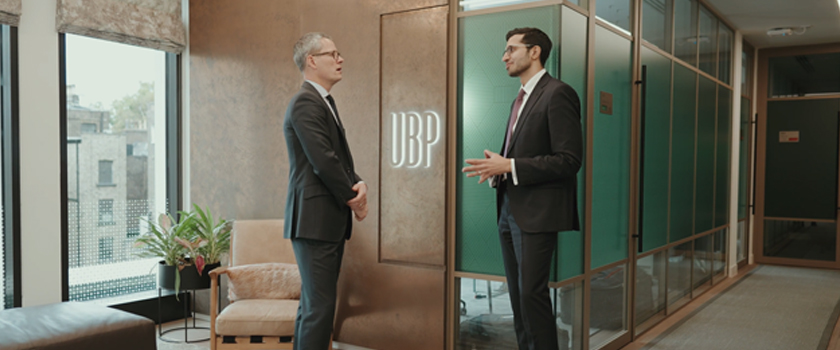The European office market is undergoing a profound transformation, driven by shifting tenant expectations, environmental priorities, and evolving investment trends. Here, Union Bancaire Privée’s (UBP) experts examine how these changes are reshaping the sector and where opportunities may lie for forward-thinking investors.
The new role of office spaces
The European office market has gone through a dramatic transformation over the past five years. Hybrid working has pushed tenants to rethink the role of office space in the corporate environment as a complement – not a substitute – to working from home. The most desirable properties should now offer a vibrant ecosystem comprising a mix of offices, convenient retail, and a healthy food & beverage scene.
Tenants’ expectations extend beyond high-end amenities. Environmental sustainability, a topic which began to emerge prior to the pandemic, has become an essential selection factor in leasing decisions. Strong environmental credentials drive higher demand and rents but almost exclusively benefit the ultra-prime segment of the market. This shift in businesses’ requirements leaves non-prime assets struggling with tenant retention.
The tenant–landlord dynamic has fundamentally changed to the benefit of tenants. As office demand concentrates in a very limited number of ultra-prime assets, landlords must proactively engage with their tenants to mitigate vacancy risks. This often comes at significant costs, which are to be borne exclusively by the property owner.
As demand falters, landlords face mounting pressure from lenders disturbed by decreasing asset values. For well-located properties, retrofitting (i.e. renovating an older asset to increase its overall environmental sustainability) may be the only solution to avoid repossession by the lender. However, these ventures are often costly and complex.
The fate of non-central business districts (CBDs) is much more dire. While most of these assets have already seen their valuations impaired, these adjustments are based on fundamental deteriorations in the CBD office market. Further corrections can be expected once transactions resume, which are likely to show higher yields than currently assumed by appraisers.
Renovating low ESG-rated properties in these sub-markets may prove to be financially unviable in the absence of tangible tenant demand. In these extreme cases, and if buildings’ structures and locations allow, these assets may be good targets for conversion, usually into residential or hospitality spaces.
From offices to logistics: Evolving investor preferences
The rapid increase in interest rates has taken its toll on commercial real estate transaction volumes, leading to a sharp contraction after 2022. Offices, which dominated the real estate market with 39% of volumes over the last decade, now only represent a quarter of recorded transactions. Investors are now increasingly targeting sectors and assets which offer greater operating leverage to generate value. This is typically found in logistics and hospitality.
Mirroring the flight to quality observed in the office rental market, liquidity returned with some high-profile transactions. However, appetite remains limited and concentrated in the ultra-prime segment of the market (i.e. prime locations, grade-A tenants, long-term leases and excellent environmental sustainability credentials). Smaller assets dominate the market, and 65% of transactions involve assets worth less than EUR 100 million, with larger lot sizes trading at higher yields.
Office yields have increased across the board: since 2020, prime yields expanded by 40% on average, from 3.3% to 4.6%, while CBD rents increased by 19% over the same period. In peripheral locations, the low transaction volumes suggest that non-CBD assets could still be subject to further devaluations. For now, appraisers have taken the approach of applying a premium to prime yields, which remains untested in real market transactions.
Where are the opportunities now?
With this grim outlook, value-add strategies may present opportunities for investors with a higher risk tolerance. With capital flowing back into prime CBD offices, an increasing number of managers are considering retrofitting older CBD assets. Whilst timely, this strategy requires a set of prerequisites to ensure successful execution.
Entry valuation is the first hurdle, and a disciplined bidding strategy is necessary to avoid overpaying at acquisition. The scarcity of suitable targets for retrofitting in European CBDs may result in inflated prices and jeopardise financial returns, particularly when macroeconomic conditions decrease the visibility on exit valuations.
The ever-changing regulations on environmental standards and requirements increase uncertainty on development costs. Managers should ideally possess internal construction management capabilities to ensure full control over costs. A deep understanding of energy-efficiency requirements is essential for proper capex underwriting and preventing excessive cost overruns.
A clear exit strategy is also essential to optimise liquidity after project completion. Asset size matters, and institutional buyers are showing a strong preference for lot sizes of between EUR 25 million and EUR 100 million, beyond this threshold, pricing will likely be impacted.
Despite these challenges, sophisticated investors may identify attractive value-add opportunities by partnering with fully integrated asset managers with strong sourcing and redevelopment capabilities.
The views and opinions expressed by fund managers (internal or external) may differ from the house view. They are shared for informational purposes and do not constitute investment advice or a recommendation.
Past performance is not a guide to current or future results. Any forecast, projection or target, where provided, is indicative only and is not guaranteed in any way. Investing in real estate involves risks, including, but not limited to, market fluctuations, regulatory changes, and liquidity risks. Investors are strongly encouraged to seek advice from a qualified financial advisor before making any investment decisions.


.jpg)







